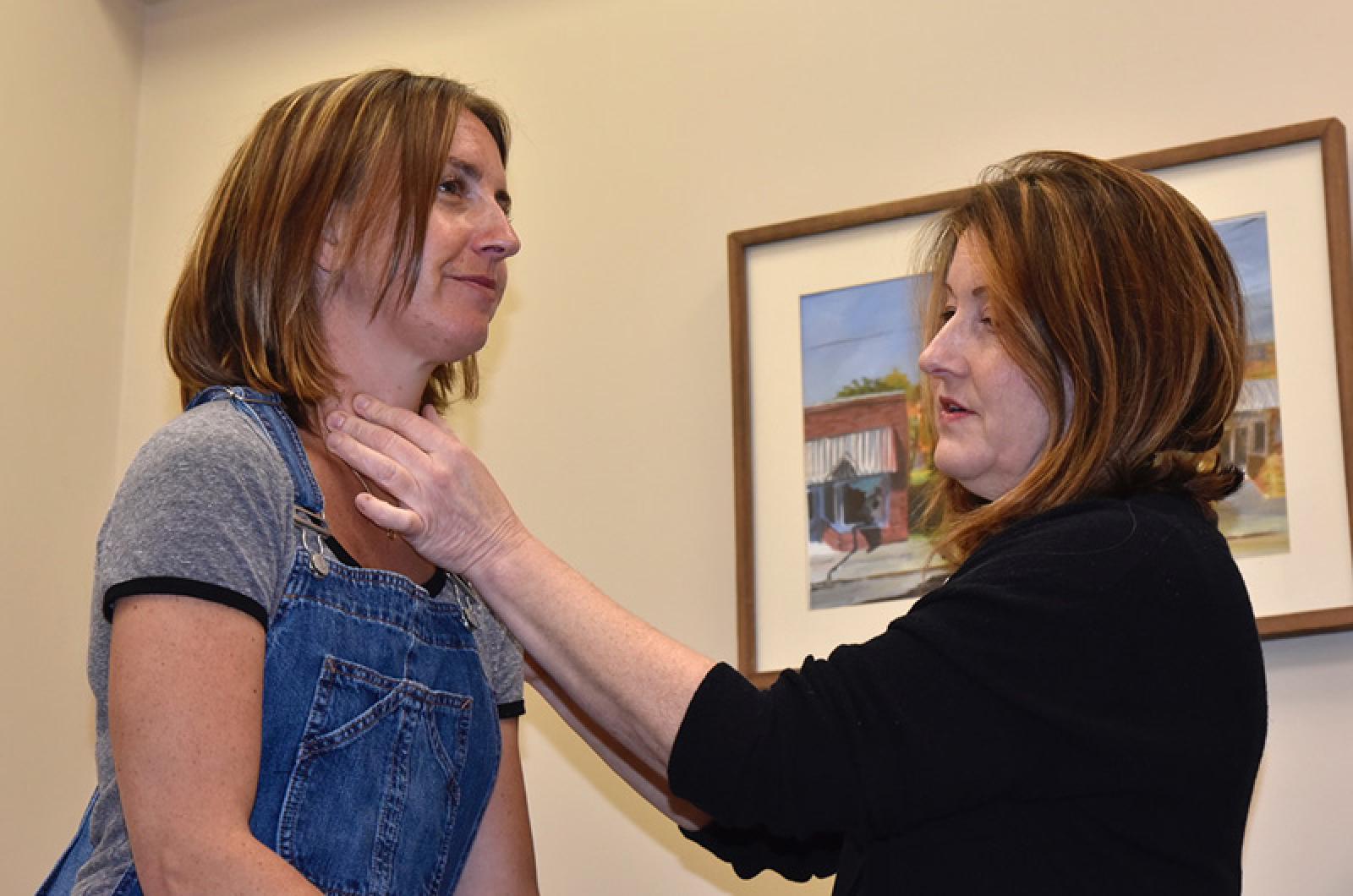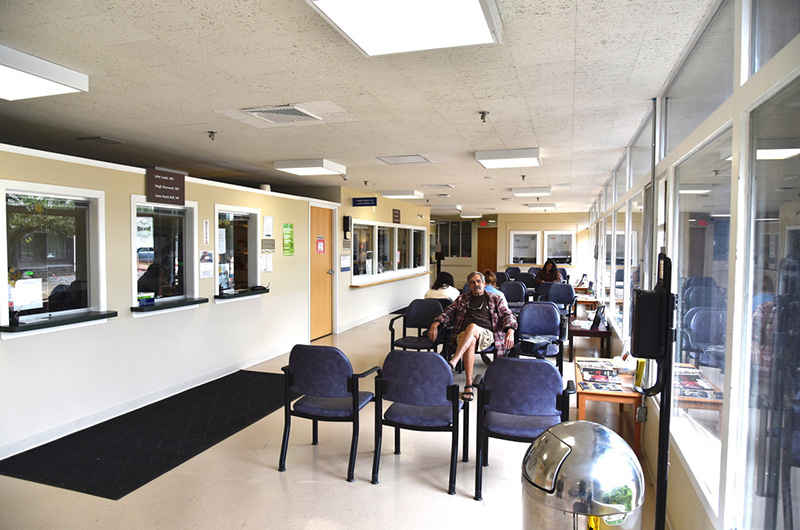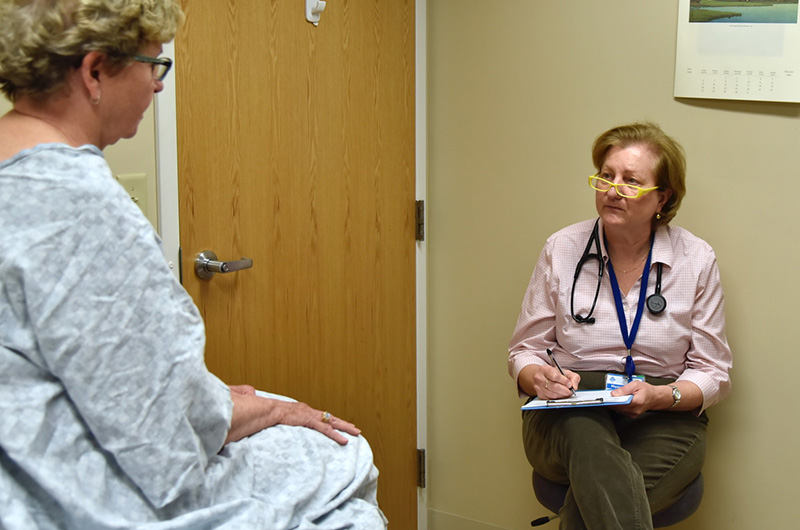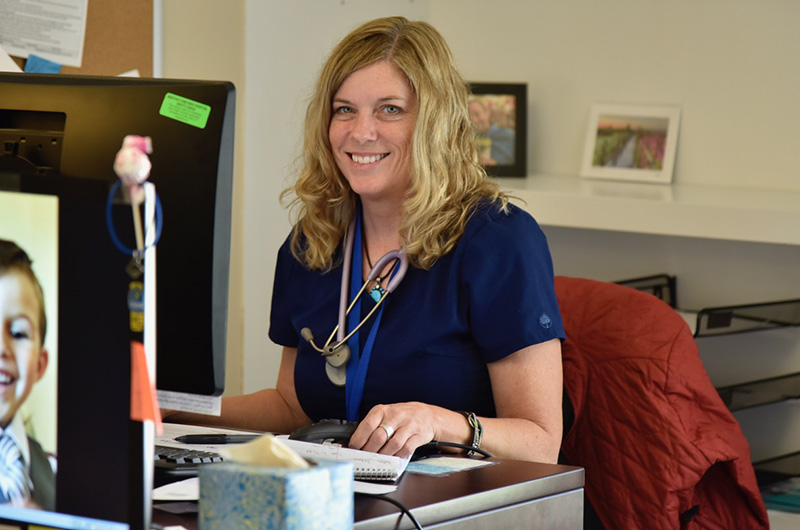After months of trying to book an appointment with a doctor on the Island, Pamela Belain of West Tisbury turned to social media early this spring.
“Anyone have a primary care doctor in Falmouth they like? I’m not having any luck finding one here,” she wrote on the Facebook page Islanders Talk.
Ms. Belain was born and raised on the Vineyard and stays busy raising her children and running a small business.
“I’m one of those Islanders who does not leave the Island unless I absolutely have to,” she said. But after calling Vineyard primary care providers and only managing to get on waitlists, she didn’t think there was another option. “I even asked my girlfriend, Can you ask your doctor if she could see me?”
Her struggle is not unique on the Vineyard.
Dukes County is considered a geographic healthcare provider shortage area by the federal government, a designation typical of rural areas with limited access to doctors. There are currently nine full-time, year-round primary care physicians in a community where the year-round population hovers around 17,000 and the summer population peaks at over 100,000. Most work at the Martha’s Vineyard Hospital; two work at Vineyard Medical Care in Vineyard Haven as well. Island Health Care in Edgartown provides thousands of Island residents with primary care through a nurse practitioner-based model.
The high cost and scarcity of housing as well as the remoteness of the Island make recruiting — and retaining — physicians especially difficult, but the lack of primary care doctors is an issue nationally. A 2015 study by the Association of American Medical Colleges predicts a shortfall of between 45,000 and 96,000 primary care physicians nationwide by the year 2025. An aging population and an increase in the percentage of people with insurance due to the Affordable Care Act has increased demand at the same time.
On the Island and elsewhere, healthcare leaders are looking to alternative models of care involving increased use of nurse practitioners and reliance on care teams instead of personal doctors. As providers are evolving and adapting to serve more patients, these leaders say, Islanders may have to adjust their understanding of what primary care means.
As of this spring, the Martha’s Vineyard Hospital, the main provider of primary care on the Vineyard, had a waitlist of about 500 people seeking a primary care doctor. Many of them were looking to switch doctors, but almost half did not have a doctor on the Island, according to Suzanne Robbins, clinical manager of the hospital’s primary care department.
The department currently employs seven primary care physicians full time, and two physicians seasonally. Physicians’ offices are housed in the hospital, and they are recruited, hired, and paid by the hospital.
According to Dr. Henry Nieder, chairman of the primary care department at the hospital, new developments in medicine and data technology have increased the demands on primary care physicians.
“Many of our problems are more complex, our population is older, the number of things that we can do medically is greater,” Dr. Nieder said. “Even without the paperwork requirement, that would take more time.”
The long patient waitlist and perception of limited access prompted the hospital to hire Ms. Robbins less than a year ago to begin coordinating primary care. She estimated that there are about 11,000 patients in the hospital’s primary care system, but that number is somewhat skewed because patient lists are not updated. She has started combing through those lists, calling hundreds of patients and getting a sense of how many people the department is actually responsible for.
“Part of figuring out who our patients are is going through that 11,000 people, reaching out to them,” she said. “If we can’t find them, if they’ve moved off-Island, then they will get crossed off. But it takes time to call all those people.”
She said she came across a number of deceased patients who had not yet been removed from patient lists.
She is also making calls to people on the waitlist. By mid-May, she had contacted about half of them to see if they were still in need of a doctor.
Hospital CEO Denise Schepici said the hospital plans to add two more full-time physicians to the staff as early as this fall, and they added three new nurse practitioners earlier this year.
To address the issue, the hospital is moving toward a team-based approach to care, also called a “medical home.” The approach allows multiple providers to share responsibility for one patient using the patient’s electronic health record to keep track of progress. Data entry for electronic health records is time-consuming, but the team-based approach increases flexibility, and is being adopted by primary care providers across the country.
Dr. Nieder, who has worked in the hospital’s primary care department for 30 years, said the organizational efforts coupled with the addition of new staff bodes well for the hospital and for the Island.
“I think this is the first time in many years that this hospital in conjunction with the other providers on Martha’s Vineyard will be able to take care of the people who are residents of Martha’s Vineyard,” Dr. Nieder said.
Though the hospital administration is optimistic about staffing, space is also a challenge.
“The ratio is you should have three exam rooms per provider,” Ms. Schepici said. “Right now, we have about 1.2 per provider.”
She said the hospital is working with the Martha’s Vineyard Commission and the state health department to move some administrative services to vacated Windemere space to open up more room for primary care.
For many Islanders, including vulnerable populations such as those who are poor, uninsured, or not fluent English speakers, Island Health Care near the Triangle in Edgartown is a major provider of primary care. The clinic is a federally qualified community health center. It receives about $1.2 million in federal funds annually to expand access to care.
Clinic founder and CEO Cynthia Mitchell says Island Health Care sees 4,000 patients each year. The facility has expanded hours and added an external clinic space in a refurbished RV next to the building to keep up with demand. The 34-foot mobile clinic was a gift from Duffy Health Center in Hyannis, which no longer needed it.
“There are more people who want to be here than we have the space to serve,” Ms. Mitchell said. “We’re open until 8 p.m. four days a week, open all day Saturdays, so we do what we can.”
Island Health Care also uses a team-based model similar to the approach at the hospital, but at the clinic, nurse practitioners provide primary care. Two collaborating physicians are available part time to review prescriptions, but neither sees patients.
“Currently in Massachusetts, a nurse practitioner can practice as independently as a physician with the exception of a very small prescription component,” Ms. Mitchell said.
Nurse practitioners typically begin as nurses, then pursue higher education. At a minimum, they have a master of science degree in nursing. The clinic employs five nurse practitioners, who together add up to three and a half full-time employees. In the clinic’s team approach, teams include nurse practitioners, nurses, medical assistants and receptionists.
“You use people at the top of their licenses,” Ms. Mitchell said. “Nurses can do a lot, and, frankly, medical assistants can do a lot to take the pressure off the provider.”
Data collection and the electronic health record play a major role at the clinic as well. Island Health Care has to keep meticulous records of their patients’ health outcomes in order to continue to qualify for federal funding, Ms. Mitchell said. Though it can be challenging, she said, keeping track of the data makes for better results.
“We have to demonstrate that we are doing the things, and succeeding at them,” she said. “That data, although it’s a lot of work to do it, this is great care for people.”

Ms. Mitchell said Island Health Care hopes to expand into the Stop & Shop pharmacy space adjacent to the clinic in coming years.
Vineyard Medical Care, a private clinic that has served patients on the Island for some 40 years, is a third major provider of primary care.
One of the clinic’s two full-time physicians, Dr. Gerald Yukevich, recently announced he will retire in September after 12 years with Vineyard Medical Care. Dr. Yukevich estimated he has more than 1,000 patients.
“It’s very hard for us to absorb all of Dr. Yukevich’s patients between now and September,” said Michael Loberg, president of Vineyard Medical Care. “Some patients will probably have to be absorbed outside of Vineyard Medical Care.” He added that Vineyard Medical Care has plans to replace Dr. Yukevich, but declined to give more details.
In addition to providing primary care for Islanders, Vineyard Medical Care offers clinical services to walk-in visitors, especially in the summer.
“We are a real provider for the summer people,” Mr. Loberg said.
Like the other health care facilities on the Island, Vineyard Medical Care has embraced nurse practitioners to expand services. They recently hired a new nurse practitioner who commutes from the mainland to offer primary care.
“We are a physician-based organization, but nurse practitioners are huge additions to the quantity and quality of healthcare on this Island,” Mr. Loberg said.
After she posted to Islanders Talk, Ms. Belain of West Tisbury got a response from someone who worked for Island Health Care. She called the clinic again the next day, and was able to make an introductory appointment with a nurse practitioner, though she wasn’t able to get a full physical until later in the summer.
“Our personalities matched really well,” she said of her nurse practitioner. She said she will not be commuting to Falmouth after all.
“She really listened to my concerns. I’m hoping I can stick with her now.”










Comments (3)
Comments
Comment policy »